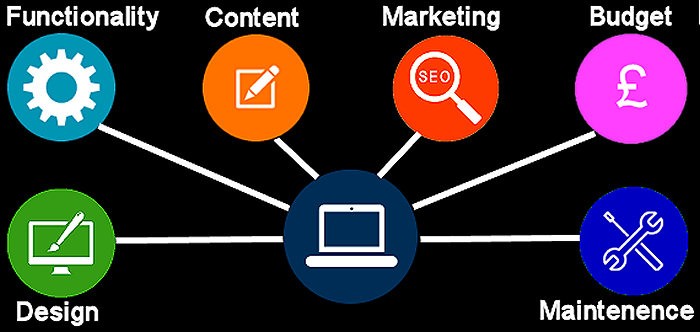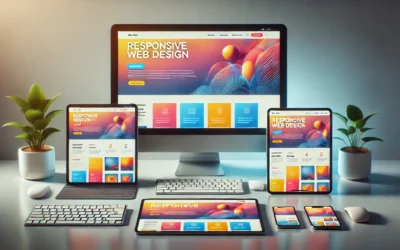In my opinion, most small business’ websites don’t work, or at least, don’t work anything like the business owner was led to believe by the web developer. I don’t believe this is simply down to cost either. I think it is down to a failure, by the website development community, to understand the process by which a website can generate business.
Ask five different website developers how much they charge and you will get five different answers, ranging from £150 to £40,000 (real examples). So what should the small business owner, with limited experience in this market, expect to pay?
My intention in this article is to focus on the small business owner whose looking to have a website developed to generate business. I will give some insight into the important factors that he should consider. In addition I with provide some guidelines as to the costs he should expect to pay and what he should and shouldn’t expect for the money.
Firstly, I’ll draw an analogy
Suppose you’re in the market for a new car. What’s the first thing you do? You don’t walk into the car showroom and ask to how much a car will cost. You usually start by deciding what you want the car for – your requirements. After that, there are many factors that will influence the cost of a car; brand of car, model choice, engine size, options choice, and more. Your budget is also a consideration.
But that’s where the analogy ends, because a great deal is known about automobiles by both the motor trade and a significant proportion of the buying public. Not so about websites and web marketing.
So what’s different about websites?
When potential customers ask me to develop a website, what most really want is more business. They are making the assumption that a website on it’s own will produce more business for them. But it won’t because, in order to do that, it has to work as an integral part of a sales and marketing process. Without that, a website will simply serve as an online brochure.
What the first thing you should you do if you want a website?
Decide your requirements. This stage is absolutely critical. What do you want the website to do for you? Everything else stems from the answer to this question.
- Do you just want a site that will serve as an online brochure that you can direct customers towards?
- Do you want a website that will attract potential customers and persuade them to contact you to do business? In other words a site that is an active marketing tool. If this is the case, and I’m assuming that most customers for websites fall into this category. then read on.
- Perhaps you’re a retailer and want a website specifically to trade online? In this case, what follows will be of relevance to you but I will address online trading and eCommerce websites specifically in a future article.
The answers to these questions will result in websites that are very different from each other. And, of course, the cost of each will be very different.
Now consider the factors that influence the performance, and cost, of a website

Design – Once you’ve decided what you want, the question of design arises? Do you want a design that will match the best looking sites on the web? A Ferrari, Rolls Royce, Bentley, Mercedes equivalent? Or a design that is professional looking but primarily functional? A Ford, Toyota, Honda equivalent? The range of costs between these two extremes can be huge so budget will be a significant factor.
What you finally decide will depend on the type of business you’re in and the type of clients you have. For example, if you are a top end financial adviser to millionaire-plus clients, then you probably need a “Rolls Royce” design, to match your image, and will be prepared to spend a lot on it. If you’re in the second hand car business, your customers will be primarily concerned that customers can easily search and find what they require. So there would be no point spending on a “Rolls Royce” design.
 Functionality – This now brings us on, neatly, to the next question which concerns functionality. What I mean by functionality are the functions that allow you to interact with the website. For example, searching, filtering, viewing image galleries, listening to audio, viewing videos, online shopping etc. So whilst the second hand car dealer won’t necessarily be spending lots on a website design that looks the bees knees, he will need lots of functionality – image galleries, search facilities, a database to hold all the information, location finding etc. All this is going to bump up his costs.
Functionality – This now brings us on, neatly, to the next question which concerns functionality. What I mean by functionality are the functions that allow you to interact with the website. For example, searching, filtering, viewing image galleries, listening to audio, viewing videos, online shopping etc. So whilst the second hand car dealer won’t necessarily be spending lots on a website design that looks the bees knees, he will need lots of functionality – image galleries, search facilities, a database to hold all the information, location finding etc. All this is going to bump up his costs.
An important aspect of functionality concerns website back-end that allows you to manage the site. To explain what I mean, take the case of an online shopping site, or even our second hand car dealer’s site. These types of site have to be continually refreshed and updates with new products and information. Also, running these sites on a day to day basis requires interaction from someone to perform task such as fulfilling orders, printing invoices, updating stock counts etc. You don’t want to have to pay your web developer to perform these tasks, you would normally appoint a staff member to perform them.
Most websites, these days have a back-end, if only to allow the website administrator to manage a blog or modify pages.
So the back-end, or site administrator’s functionality is, effectively, a hidden cost that you may not be aware of when you first start thinking about having a site developed. Moreover, it’s not simply a development cost. You may need to factor in the cost for someone to administer the site. This may be in the form of existing staff’s time or money to hire additional staff to do the work.
 Content – But what really, determines whether or not a site is effective is the content – the words/images/audio/video that appear on the pages. It is these things that will generate excitement for the people viewing the site, cause them stay on the site and, hopefully, make enquiries or even buy your products. You can have the best looking site in the world but, if the content is not up to scratch, the site will be ineffective.
Content – But what really, determines whether or not a site is effective is the content – the words/images/audio/video that appear on the pages. It is these things that will generate excitement for the people viewing the site, cause them stay on the site and, hopefully, make enquiries or even buy your products. You can have the best looking site in the world but, if the content is not up to scratch, the site will be ineffective.
In the past, many web designers have worked on the basis that they only develop the design and functionality, and then leave the customer (you) to supply the content, which they simply drop into the site. Some web designers still work on this basis. But it’s wrong. The content is the most important part of the site.
Content need to be worded and structured correctly in order to channel the user into taking action. Regard the site a funnel where, you move the visitors through until they eventually reach the pages where they will take action, for example, filling in the contact page or picking up the phone and making an enquiry.
Of course, designing all this content so that achieves the results you want is not free and can add significantly to the cost of your site.

Website Marketing – People need to be able to find the site. Build it and they will come. That might have been the case in the movie but, for websites, that just won’t happen. There’s no point in spending a fortune on a fantastic looking, highly functional website, if no one sees it. So the next thing we need to look at is marketing the site.
This is an area that is virtually open-ended. You could literally spend millions on it. So I’m not going to go into everything only to tell you the absolute minimum you should be spending money on. What’s more it’s an area that is changing at near light speed so what I write now could be different when you get to read it.
Most people are going to find your site through search engines. Primarily Google. This means that the site should be designed so that it has the best possible chance of being found. You may have heard the term Search Engine Optimization (SEO); essentially the art of tricking search engines into giving your site better rankings. In the past SEO involved things such as getting a certain density of keywords into the text on your site; getting as many other sites as possible to link to your; and many other, sometimes dubious, practices. Nowadays, changes in Google’s algorithms have made this kind of SEO virtually ineffective.
- Keywords are still important but other factors are equally, and sometimes more, important these days. for example:
- Content, particularly in the form of articles, white papers and blog posts.
- Social media can serve to influence search engine listings and also to direct traffic to your site.
Sponsored search (Pay-per-click, e.g. Google Adwords) is an excellent way to direct traffic to your site, especially if it’s an eCommerce site. However, this form of advertising can be expensive and is best left to a specialist to set up and manage. Don’t be tempted to run a pay-per-click campaign without first ensuring that the website can convert visitors to leads.
 Maintenance – Launching your website is only the start. A website is a marketing tool that should be developed and expanded as your overall marketing strategy develops and expands. I see too many small businesses that launch a website and then let it languish, untouched, for years.
Maintenance – Launching your website is only the start. A website is a marketing tool that should be developed and expanded as your overall marketing strategy develops and expands. I see too many small businesses that launch a website and then let it languish, untouched, for years.
A good strategy is to take out a monthly maintenance contract, whereby you pay your developer a modest monthly fee to undertake various maintenance tasks. These tasks should include.
- Making changes to the site. A typical maintenance contract will put a cap on the number of hours allocated to changes depending on the monthly cost. It should also allow you to roll unused hours over to following months.
- Monitoring search engine performance and making changes to improve search engine rankings.
- Monitoring conversion stats and making changes to improve conversions.
- Performing site backups.
- Updating software. For example, Installing new versions of platform software such as WordPress or Joomla, and their associated plug-ins and add-on modules.
- Giving telephone advice and support.
You can use a maintenance contract to start small and grow your site. If your budget is limited then you can start with a basic website and expand is using monthly maintenance. You will only be able to do this though if your site is capable of being expanded and changed easily, so bear this point in mind when commissioning your website developer. Look on the site that you launch as the start, not as an end in its self.

Budget – To a large extent, your budget will determine your cost. If you have a small budget then you have to accept that you’re not going to be able to get a website that does everything you would like it to from the word go. Temper your requirements to fit your budget. The best way to do this is to start small and add on to the website as and when you can afford to do so. A monthly maintenance contract, as described above is an excellent way to do this.
To do this though, make sure that the website that is developed for you is capable of being extended without major rework, even if it’s a very small site. Most websites developed using a content management platform such as WordPress will fit into this category.
So after all this, what’s the answer to “how much does a website cost”
For a small website with about 4-10 pages, expect to pay around £300-£600 plus an annual hosting cost of around £50-£75.
For this you should expect;
- A professional looking design. Most web developers will use a content management system such as WordPress with a template that has been customized to match the look and feel that you require.
- Good quality content. Some web developers will simply produce a design and expect you to provide the content that goes on the pages. Don’t accept this. A good web developer should be prepared to take content from you in note form and then rewrite it and structure it to fit neatly into the site.
- High quality images. The web developer will usually be prepared to source any stock images, although you may have to pay extra for these. If you want your own images, and I highly recommend that you do, then you will be expected to provide these. I recommend that you get the highest quality images possible, even if this means hiring a professional photographer. Nothing lets a website down more than cheap looking images.
- The site should be search engine friendly, by which I mean, built to have the best chance of getting listed in search engines.
The cost will rise significantly if your requirements are for more than this, involving some, or all, of the factors described earlier in this article.
For a small business starting out, what do I recommend?
Decide your requirements before starting. Get this wrong and you could be paying significantly more than you need to, and end up with a website that will do nothing for you.
If you have a limited budget then don’t blow it all on unnecessary, clever design. You need a professional looking site but you don’t need one that will win design awards.
Don’t skimp on content. Content is important so focus your budget on it rather than clever design.
Ensure that your website can be easily extended, and be prepared to add more, and improve it, when you have additional budget, or via a monthly maintenance contract.
In conclusion
Pricing a website is not straightforward. I started out by explaining that you need to decide your requirements. I will end by re-emphasizing this point. Everything stems from your requirements. Get this wrong and you could be paying significantly more than you need to. Or conversely, you could end up with a website that simply doesn’t do the job you expected it to do.






